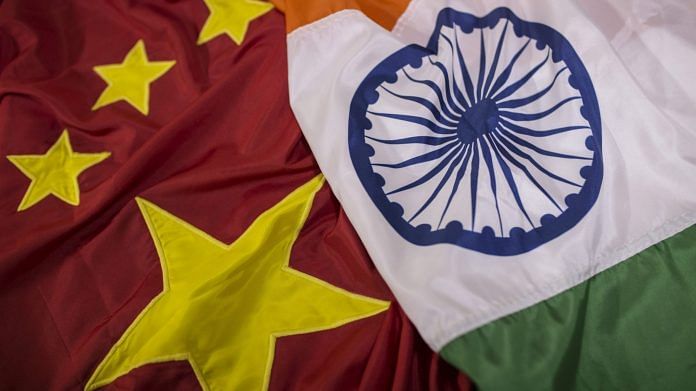New Delhi: India’s ability to independently balance China is going to be at risk if it doesn’t get back to its growth rate, Ashley J. Tellis, Tata chair for strategic affairs and senior fellow at Carnegie Endowment for International Peace, has said.
Speaking at the Global Technology Summit 2020 organised by Carnegie India, Tellis said India’s ability to do “cooperative balancing” of China would also be at risk “because any partner of India would want to see a resilient and capable India, not a weak India”.
His comment came in response to a question posed by Tanvi Madan, senior fellow, foreign policy program and director, The Indian Project, The Brookings Institution, about how India’s material capabilities will affect the perceptions of it as a power.
For India’s capacity in a cooperative relationship, it had to get its growth rate back.
New Delhi needs to rethink its economy and foreign engagement, he said. “To my mind, it only means that it has to open up its economy even more clearly to its friends,” Tellis added.
India’s economy, now in technical recession, had been slowing even prior to the pandemic. Its growth rate was at an 11-year-low of 4.2 per cent in the 2019-20 fiscal.
Tellis was speaking as part of a panel titled The World We Live In. C. Raja Mohan, director, Institute of South Asian Studies, National University of Singapore, and Vijay Gokhale, nonresident senior fellow, Carnegie India, and former foreign secretary of India, were the other panellists.
‘There can be rebuilding of relationships’
Asked about the status of India-China relationship as of today and whether it demanded any policy changes, Gokhale said the border stand-off at Galwan Valley was a “seminal” event in these two countries.
He said if the Line of Actual Control (LAC) problem can’t be resolved peacefully, then moving ahead on other issues would prove to be “difficult”.
“If we can resolve this peacefully, it is my conviction that at the political level, given the stature PM Modi and President Xi Jinping enjoy in their countries, and the fact that they know each other, there can be rebuilding of relationships,” he said.
The former foreign secretary noted that prior initiatives in India-China relations didn’t originate from the bureaucracy or public opinion, but rather from a political level.
Also read: Our vaccine production, delivery capacity will be used to help all humanity — India at UN
China’s relations with US & India
Asked what US President-elect Joe Biden’s approach to Beijing would be, and where India-China relationship would be next year, Tellis said there is a widespread popular consensus in the US that China represents a strategic challenge.
This meant that “there are very few constituents left today who would argue for going back to the straightforward world they knew”, he said.
Biden has indicated that he wants a “rational” and a more “targeted” competition with China, said Tellis.
Mohan pointed at how India was looking at two “structural problems” in the US policy when it came to China. “One, is the US focused on producing a balance of power in Asia? Or is it about resetting the relationship in China?”
Tellis said the imperative to “balance” Chinese power because of its threat to India’s territorial disposition was “blocking” Delhi from a range of global issues.
Also read: Modi and Hasina to inaugurate historical rail link, closed during 1965 war, at summit
Future of globalisation
Asked about the strategic trends in the coming decade, Gokhale said the “intensification of Sino-US relations” would prove to be significant.
“There is broad agreement that this intensification will pose challenges for India. The challenge here is that whether (we) have to make a choice between them or find a way of maintaining our strategic independence,” he said.
Tellis said the next few years would be spent “consolidating” recovery from the pandemic. But he also expected the intensification of US-China relations to take two forms.
“One would be the gradual evolution towards bipolarity in the international system wherein China and the US will emerge to be in different leagues,” he said.
The second would be a “restructuring” in the future of globalisation. “It looks like we’re moving towards a fragmented world. Are we going to replace globalisation which was coterminous with the whole system with now smaller networks of coalitions and countries?”
Tellis said the “fracturing” of global order into “splintered parts” would be something to watch out for.
Mohan recalled that US President Donald Trump had challenged many key aspects of globalisation ranging from economic integration, free trade and open borders. “The problem with this system is that President-elect Joe Biden can’t abandon what Trump taught,” he said.
Mohan added that there might be some “internal contestation” of the China policy in the US which may prove to be a problem. “We are seeing a recasting of globalisation. There will be rethinking on the terms on which major economies engage with each other.”
ThePrint is a digital partner with Carnegie India for the Global Technology Summit 2020.
Also read: India welcomes UK’s ‘Indo-Pacific tilt’ as Foreign Secretary Raab visits New Delhi




If India doesn’t get its growth back, apart from China, we should also worry about stunted, wasted children. India may still be Shining in the think tanks of the West, but on the ground, things are becoming very grim.